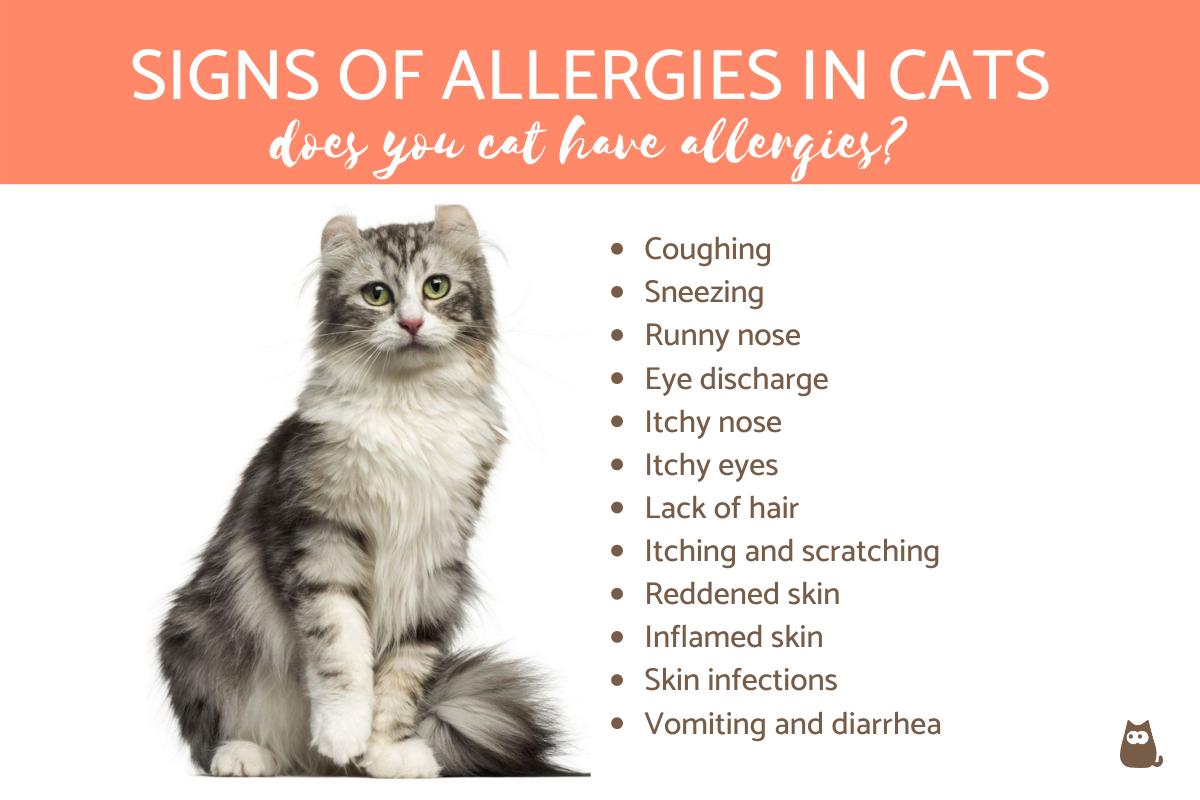Signs of Allergies in Cats - Does Your Cat Have Allergies?



See files for Cats
Just like humans, cats can also suffer from allergies. As their caregiver, it's very important for us to recognize the common symptoms of allergies in cats. This way we can bring them to the veterinarian to be properly diagnosed and treated.
In this AnimalWised article we're going to explain the clinical signs of allergies in cats, so that you can know if your cat is suffering from an allergy. Keep reading to learn more about allergies in cats!
Allergies in cats
Allergies are a physiological reaction of the body that arises when the immune system detects some substance that is harmful to the body. Just like in humans, cats can also suffer from allergies. Therefore, allergies in cats is a defense and warning system that something is damaging the health of our kitten.
Felines can have allergies to many different things as we do. Some of the most common allergies in cats are the following:
- Certain plants
- Mushrooms
- Pollen
- Certain foods
- Tobacco smoke
- Perfumes
- Flea products
- Cleaning products
- Plastic materials
- Flea bites
Learn more in our article about the most common food allergies in cats.

Serious allergies in cats
Cats can have mild allergies that won't affect them so much, but in some cases their allergies can be serious and will need more attention. The following factors will make their allergy more serious:
- The amount of allergens our cat is in contact with: for example, if you are allergic to pollen, in spring there is much more quantity and our feline will be much worse than at other times of the year.
- The association of other allergies: it is typical for a cat with an allergy to have other allergies as they are very sensitive. For example, if you are allergic to pollen, it is likely that you are also allergic to some food.
- The association of other diseases: this leaves affected felines weaker and with very low immune systems. Also, problems like skin infections will make the cat scratch a lot more.
- External factors: excessive heat and the presence of things that cause stress to the allergy-affected feline are other factors that will make the allergy and its symptoms worse, such as continuous scratching.
Common symptoms of cat allergies
As there are many types of allergies in cats there are also many symptoms. Here are the most common and easy to identify symptoms of allergies in cats:
- Coughing
- Sneezing
- Runny nose
- Eye discharge
- Itchy nose
- Itchy eyes
- Lack of hair
- Itching and scratching
- Reddened skin
- Inflamed skin
- Skin infections
- Vomiting
- Diarrhea
Remember that if you observe any of these symptoms or more than one, you should take your cat to the veterinarian immediately for testing and treatment.
Diagnoses of allergies in cats
It is often difficult to find the exact cause of their allergy. This is why veterinarians often have to run various tests as the allergen is detected by eliminating the possible causes until they locate the cause. The most common ways to diagnose the origin of an allergy in a cat are:
- At the veterinarian centre, different tests such as blood tests, skin scrapes from the affected areas and allergy tests, among others, are done.
- In the case of suspecting a food allergy, to identify which is the food that causes the allergy to our cat we must not give them the food we suspected was the cause. Once the allergy has passed with the treatment provided by the veterinarian, we can introduce it back into their diet, little by little with the guidance of our trusted veterinarian.
- At home we must remove the objects suspected of causing any allergies from the environment of our cat. If the allergy subsides and we want to know what the trigger is, we will introduce the removed objects one by one again to observe the symptoms in our cat until we find the cause of the problem.
This process is always done with a veterinarian, following their guidelines and decisions. Make sure to bring your cat to the veterinarian if you notice them experience any abnormalities in their behaviour or appearance.

How to treat allergies in cats
There is no medication that cures allergies, only the appropriate antiallergic can be administered according to the diagnosis, as well as removing the object causing the allergy. Therefore, the treatment to be followed will depend on the type of allergy the veterinarian believes the feline is suffering from. Therefore, the treatment will depend on each case as it can greatly vary.
If we detect that the allergy comes from food, the treatment is simple since the vet will inject our cat with antihistamines that reduce the symptoms and will recommend that we give our cat a special hypoallergenic diet. These foods contain nutrients that do not cause allergies in cats and thus in a minimum of 12 days we will see a clear improvement in our cat's behaviour. In these cases it is recommended that the hypoallergenic diet is for life.
If we observe that our cat is missing hair and has red and inflamed skin on its back, neck and tail, it is most likely that our kitten has an allergy to flea bites, specifically flea saliva. The allergic reaction begins as soon as our cat is bitten by a flea. In severe cases it can spread to the legs, head and abdomen. In addition, it will end up triggering a miliary dermatitis with scabs and peeling of the skin. In this case, we must take them to the vet so that they provide them with the necessary medication to relieve the allergy. In addition, they will recommend eliminating all fleas from both the cat and its environment and giving him baths with special soap to calm the itching and help to recover the health of your skin. We should always use an anti-flea treatment, especially in the months when they are more active, thus preventing fleas from biting our cat allergic to them.
Sometimes cats are allergic to some plastic materials with which the feeders and drinkers that we use for them are made. We will detect this allergy because skin and hair problems will occur in the area of the head, face and more specifically the nose. They won't be able to stop scratching and will avoid eating or drinking from these containers. We must go to the vet to treat the symptoms of skin allergy as in the previous case and we must remove these containers and provide stainless steel, glass or porcelain bowls that do not cause allergic reactions in our feline.
In the event that the diagnosis made by the veterinarian reveals that the feline's allergy comes from the habits that we have at home, we must change and stop these habits so that our cat stops suffering from allergies. In addition, the vet will need to provide the necessary medication to help remission of the allergy. Some of these habits that cause allergies in domestic felines are the use of tobacco, perfumes, certain cleaning products and the accumulation of dust, among others. All these components produce a respiratory allergy and even asthma.
The case that most complicates the coexistence between cats and humans is the allergy that a cat can have to people. That is, to dandruff and peeling of the skin of humans. In this case, the veterinarian will provide the appropriate antiallergic treatment and we must try to have our house as clean as possible in terms of dust, because that is where our remains of peeling skin accumulate that cause an allergy to our cat.
This article is purely informative. AnimalWised does not have the authority to prescribe any veterinary treatment or create a diagnosis. We invite you to take your pet to the veterinarian if they are suffering from any condition or pain.
If you want to read similar articles to Signs of Allergies in Cats - Does Your Cat Have Allergies?, we recommend you visit our Other health problems category.







